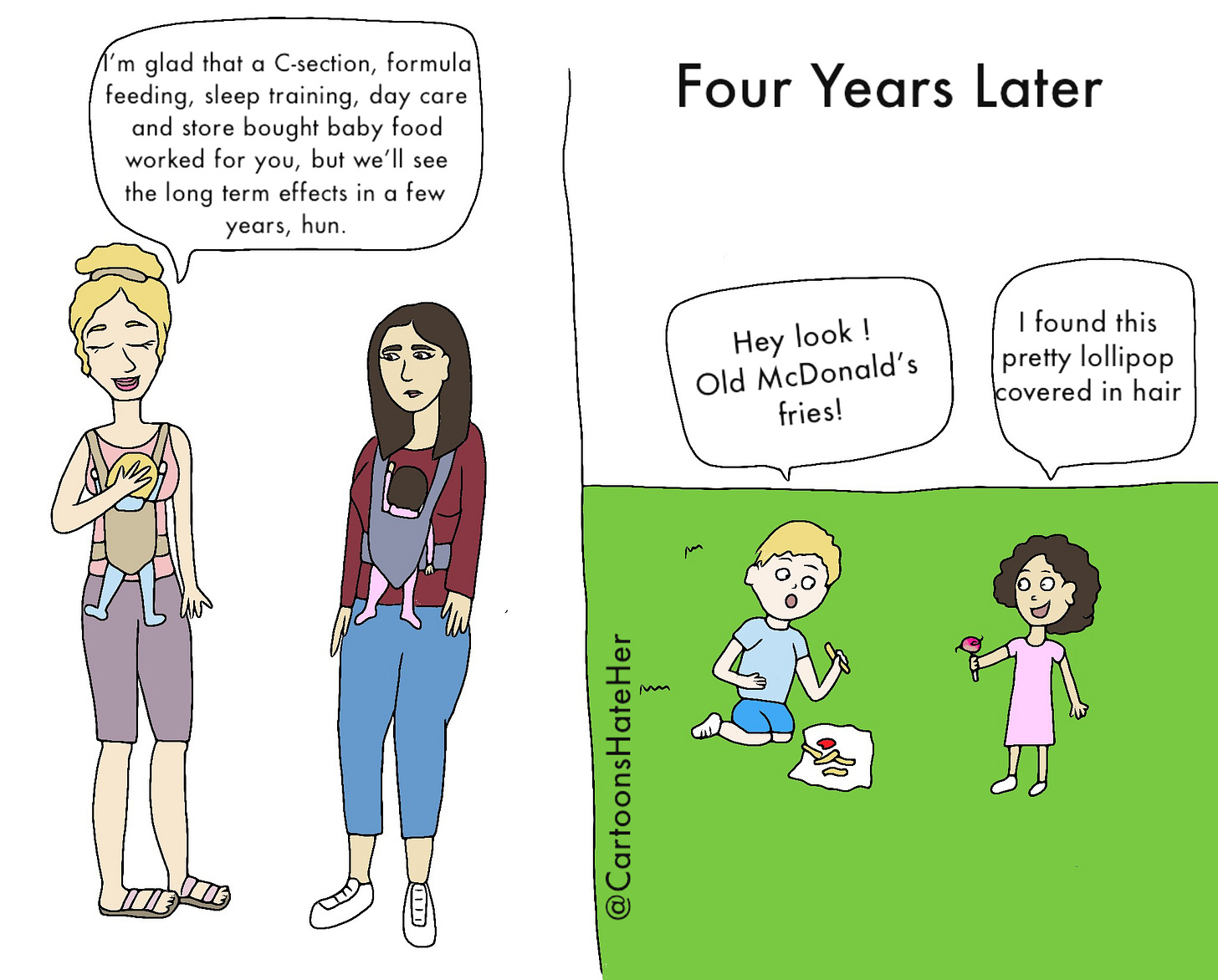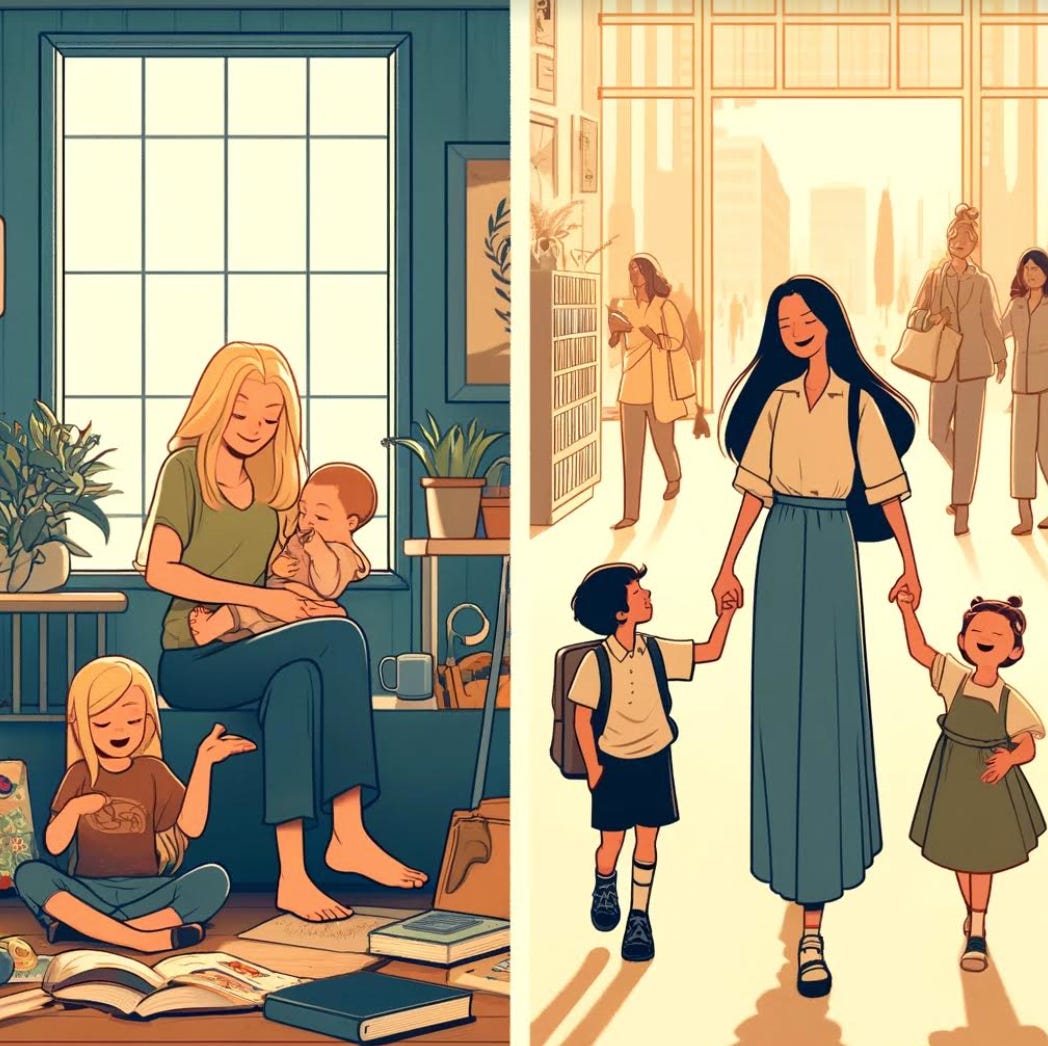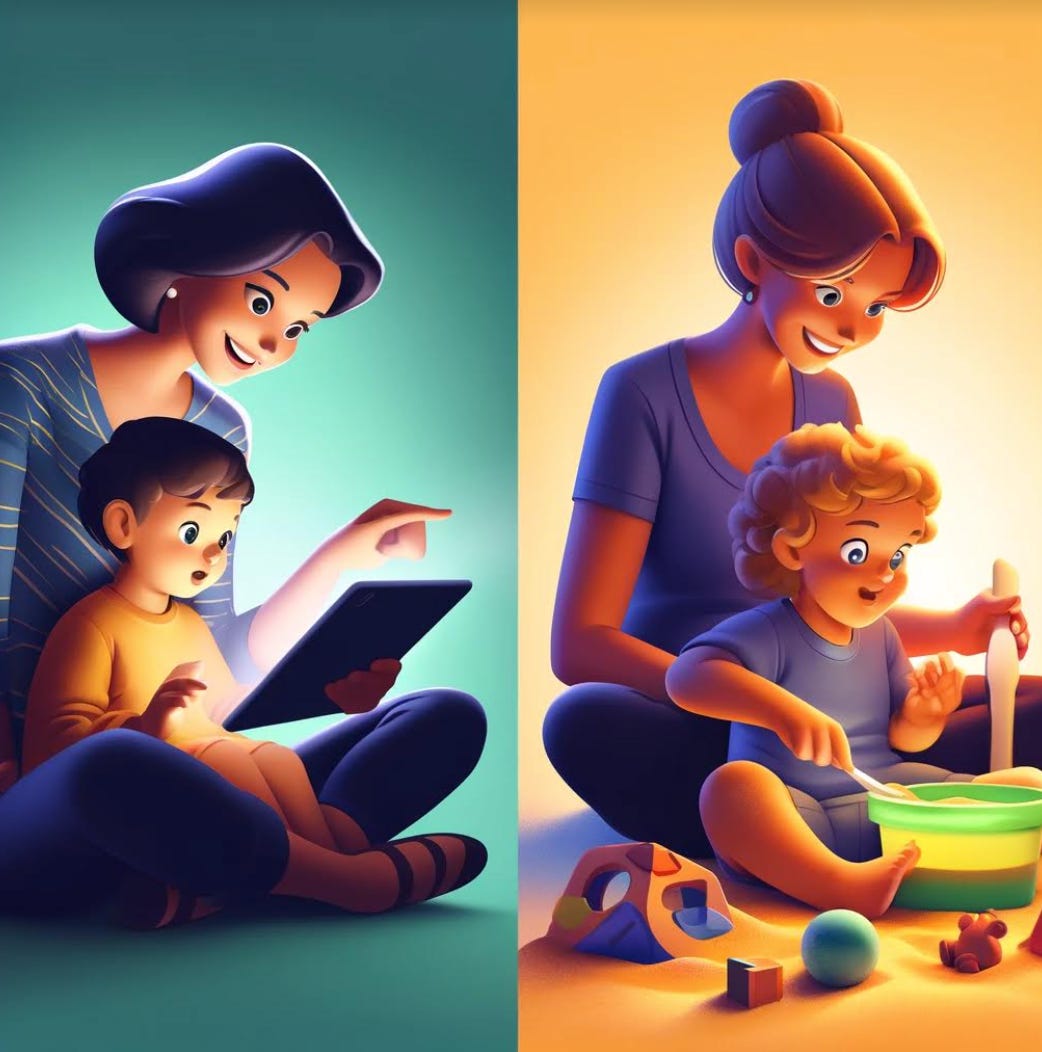Friendship Ended with Body Image Issues, Mom Guilt Is My New Best Friend
Trading one social media insecurity for another
As many women on Twitter have noted recently, our TLs are awash with “edtwt” content, or eating disorder Twitter. It’s not clear why, because many of us aren’t actively dieting or searching for this stuff, let alone actually affected by eating disorders. I try not to engage with it on purpose, and I certainly never comment on it, but I must have inadvertently given it some traffic at some point because now about 20% of my feed is extreme thinspo. Of course, I don’t have an eating disorder so quite a lot of this just makes me feel sad for those who do, but even women without eating disorders aren’t immune to somewhat normal-looking thinspo—svelte bikini pics, impossible waist-to-ass ratios, airbrushed thighs, perky boobs.
When I was younger, it was easy to see impossibly beautiful women and feel bad (for me it was less about wanting to be skinny, and more about wanting to have a perfect hourglass shape and flawless skin.) Now that I’m nearly thirty-five and still holding onto about ten pounds of baby weight, you’d think that such content would trigger me more than ever. But it doesn’t. I find myself fairly immune to any kind of body image pressure on social media. Yes, I’m trying to lose weight, but mostly for the purpose of fitting into my old clothes that I love. Do I hate my body? Absolutely not! My body birthed two amazing kids! Who, by the way, I’m constantly failing by being the worst mother ever.
Oops, there it is.
I thought I had high confidence and high self worth because impossibly curvy waists and shiny hip-length hair don’t make me feel gross. But I merely traded one insecurity for another. While I’m perfectly at peace with looking my age, not being a size 0, and not using any kind of Botox or fillers, you know what I’m not at peace with? My abilities as a parent. Because social media algorithms correctly figured out that the thing that makes me feel inadequate is not lithe, tanned twenty-year-old bikini models sporting Gymshark matching sets, but messy-bunned, glasses-wearing, average-sized thirty-seven-year-old women in Everlane sweaters who can handle toddler tantrums with the serene disposition of the Dalai Lama, who build bespoke sensory bins and bento boxes every morning, who self-effacingly say they will allow their house to be “a mess” so they can prioritize their children but whose houses are never actually messy, who kindly and gently remind me every day that if I need to grab a cup of tea in the morning before playing with my child, I’m setting him up for lifelong attachment issues.
That last one is not an exaggeration- I saw a reel once where a woman said that failing to drop whatever you’re doing immediately and instead saying “give me a second” is a form of “emotional neglect.” This was years ago and I think about it every day.
I suspect I’m not alone in this. As a young woman I used to wake up every day and think about how many pimples I had, how my hair wasn’t long enough, and how I needed to drink more water. Now, as a not-quite-young woman, my first thought in the morning is “How can I spend more time with my kids?” not only because I love it (although I do) but because I’m terrified I will accidentally give them some kind of emotional disorder if I’m not correctly engaged. A great deal of the time I spend with them is clouded with fears of not doing it right. Because you see—even “spending time with them” doesn’t really count if you’re watching a movie together, or if you have to text your husband or respond to a work message in the middle of the play pretend game. It also doesn’t count if you aren’t actively engaging in their pretend play. Merely sitting by and observing could be an unintentional reenactment of the “Still Face Experiment,” which is the obsession and fear of every mom on r/ScienceBasedParenting, a subreddit that seems to attract the most neurotic and terrified parents who are arguably doing more than they need to, and convinced they are doing too little.
I’ve tried to block content that’s especially anxiety-provoking, but it somehow still resurfaces in other forms because algorithms are smarter than people. Given that I write about parenting sometimes, and I mostly consume Twitter content, I can’t very well mute the words “children” or “moms.” And, counterintuitively, I find myself compelled to click on things that I have a feeling will upset me, motivated by some lingering hope that the video (which I’m 99% sure will be about how I’m failing in some way) will surprise me and provide validation.
I used to compare myself to other women who got engaged before I did. The timeline of engagement has been replaced with the timeline of breastfeeding—this woman breastfed for three years and her kid will probably love her more than my kids love me, especially because I 50-50 combo-fed my second. Perhaps I was “tricked” by doctors to supplement with formula. Perhaps if I had just pumped at 3 in the morning my supply would have been enough. Oh great, another video on social media about how formula is poison and how it has “chemicals” in it and I need to be making my own formula out of raw goat milk. I’ve poisoned my child! Because of course I have!
And it doesn’t stop once your child is too old to need breastmilk or formula. What about Red 40, which I’m being told causes ADHD (I think with my and my husband’s genetics that’s more or less baked in anyway) and cancer?! Did you know that almost every American food is banned in Europe and classified as industrial waste? Why am I carelessly blending purees for my baby instead of doing baby led weaning, which I’m being told is a choking hazard but also entirely necessary to prevent picky eating or binge eating?
At this point, you may want to admonish me for comparing myself to others, or “caring what other people think” or falling victim to social media algorithms. To you I say: shut up.
I find myself trapped in a false belief that if I just try hard enough, I will feel better about myself, the mom equivalent of believing that I will be perfectly happy with my body once I finally fit into a Lululemon size 2. But trying hard in any one area won’t help—the guilt will resurface elsewhere. For example, I’m a big fan of cooking, hosting people and throwing parties. I also sew some of my kids’ clothes. But these creative pursuits make me feel bad sometimes, because they are to some extent for me, and the energy that goes into making cupcakes for a graduation party for three-year-olds is not spent on my actual kids. I recently met up with a mom friend of mine who mentioned her own mom guilt about working so much, and she casually said “You wouldn’t be able to relate of course, you’re the overachieving supermom with the crafting and the parties…but I just didn’t have energy to throw a birthday party this year.” I had to tell her that not only did I not feel like “supermom” at all, but the things she saw as positives were actually some of my biggest insecurities, and I admired her for how career-driven she was and how much she still managed to do for her kids. Similarly, I felt the urge to get out and about after my C section—I didn’t feel like myself if I hadn’t showered, and I wanted to put on makeup and nice clothes a couple times a week. I realized that this practice might have made other moms feel bad for not showering and staying in bed. But those moms actually inadvertently made me feel insecure—I worried that focusing on my own mental health and appearance was taking away attention from my kids.
Of course, I’ve talked to my therapist about my mom guilt. I’m seeing her for OCD, but this is arguably a new obsession for my OCD, along with the “old reliables” like accidentally causing my loved ones getting seriously ill or injured, or inadvertently offending people who could ruin my life. However, unlike other OCD obsessions that are, on the face, pretty absurd (as a teen, I once had an anxiety attack over believing my mom was eating a Whole Foods salad bar dish that imaginary neo-nazis might have laced with ricin), mom guilt is harder to shake. Is it bad to care about your kids or to want to be the best mom ever? I deeply want to drop some of my obsessions which feel like they make my life worse, such as anxiety about my husband traveling for work. But do I really want to drop my mom guilt? What if I dropped it, and my lack of mom guilt meant I no longer felt motivated to be a great mom? What if, in the absence of mom guilt, I became a terrible mom? I mean, I get that I’m a terrible mom now but…a worse one? If such a thing exists.
The self-flaggelation is a part of the ritual. When both of my kids got RSV, my older one was largely fine but my newborn decided to go on a hunger strike, probably because of a sore throat and a gag reflex triggered by coughing. Terrified that she would get dehydrated but wanting to keep her out of the ER, I stayed up with her all night and held her while I slowly fed her pumped breastmilk with a syringe that I had left over from the very IVF transfer cycle that enabled her to be born. (In case anyone is picturing me feeding her with a needle, I’m just talking about the plastic part- the needle part is separate.) The experience was awful and I wouldn’t want to repeat it—nobody likes to see their child sick and nobody enjoys staying up all night to painstakingly drop milk into a crying mouth. But once it was clear that she was doing better, the ritual of the syringe-feeding felt like worthwhile atonement for my parenting sins, like going on my phone while breastfeeding and not bed-sharing. I had served her faithfully in a way that was extremely inconvenient for me, solidifying that I couldn’t possibly be such a terrible mother. I found myself quick to “complain” about that night, while secretly proud of myself, because the more I talked about it, the more I could believe that I had done something good.
And therein lies the crux of the issue- the same way women who Photoshop their bodies on social media are likely doing so out of their own insecurity but inadvertently triggering insecurities in others, I’m convinced that a lot of “complaining” moms do about their mom duties actually comes from their own insecurities. And because vulnerability isn’t appealing, and you set yourself up for judgment if you openly talk about feeling insecure about your parenting abilities, moms instead default to martyr mode and discuss all the ways they’ve sacrificed for their children and how little of a life they have. Perhaps they don’t even need outside validation—they just need to hear themselves say that they’ve done something right. But other moms listening might hear “I haven’t slept in three years because I have no problem tending to my toddler eight times a night” and instead of thinking “Wow, I’m lucky my kids sleep better than that” they might think “What am I doing wrong? Are my kids sleeping well because I’ve accidentally neglected them and they think nobody is coming for them? Did I inadvertently recreate the conditions of the infamous Romanian orphanage?”
This is one reason that “mom discourse” is so toxic. The decisions you make as a mom are the most important decisions you’ll ever make, provided you aren’t someone with access to nuclear codes. When you say that you’ve made a certain decision (for example, working versus staying home, or using screens versus not using screens) you are implying that the other choice is harmful to children, or at least not beneficial. You can say “this is just me, I don’t judge anyone who does things differently” as I often do, but the implication is there. You made the choice for a reason. Yes “every kid is different” but on some level you think you chose the better thing, otherwise, why would you have chosen it? It can be difficult to reach across the aisle sometimes and talk with women who have made all the opposite decisions we have, feeling neither judgmental of them or judged by them. I try to follow as many different moms on Twitter as I can for this reason. I challenge myself not to feel attacked by the fact that they homeschool and I don’t, or the fact that they had ten unmedicated home births and both of my births were very medicated and in a hospital after IVF. I try my hardest to see other moms as diverse people in a network that all need to support each other through our differences, but it can be hard.
I have no solution for this problem, of course. And like I said, I have a therapist already, so everyone “getting therapy” isn’t likely to magically fix this. But I do wonder if we would be better served by just being vulnerable and admitting that we feel like bad moms sometimes. There’s no way it’s just me. And there’s no way it’s just you.







The most important reason these women do what they do on social media: they get paid to do it! You don't get paid (usually) in real life to be a mom. The unseen labor of household help (cleaning the house, watching the kids while filming, childcare while research is done/videos are edited, etc) and the money to pay for it looms over these videos. It's easy to say "take what you want and leave the rest", but that's the best I can come up with.
“Did I inadvertently recreate the conditions of the infamous Romanian orphanage?” This line is pure gold, perfect to help me snap out of any future spirals. Amazing read!!! I love all your writing on parenting 😌 PS. you sound like you’re doing a great job as a mom too :)